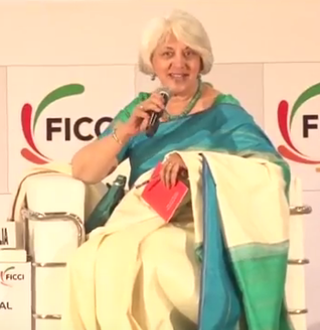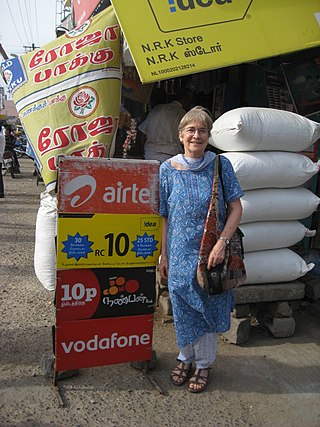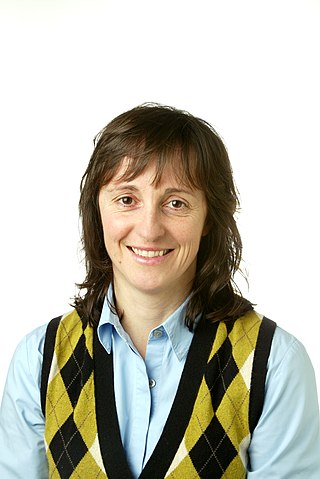
Pierre Pestieau is a Belgian economist.
Trevor A. Sheldon is a British academic and University administrator who is a former Deputy Vice-Chancellor of the University of York and Dean of Hull York Medical School. He has held academic posts at the University of York, the University of Leeds, the University of Leicester and Kingston University.

Isher Judge Ahluwalia was an Indian economist, public policy researcher, and professor. She was Chairperson Emeritus, Board of Governors, at the Indian Council for Research on International Economic Relations (ICRIER). She had also served as the chairperson of the board of the International Food Policy Research Institute, and the chairperson of the Government of India's High-Powered Committee on Urban Infrastructure Services. She was awarded India's 3rd highest civilian award, Padma Bhushan, in 2009.

Armin Falk is a German economist. He has held a chair at the University of Bonn since 2003.

Mariana Francesca Mazzucato is an Italian–American-British economist and academic. She is a professor in the Economics of Innovation and Public Value at University College London (UCL) and founding director of the UCL Institute for Innovation and Public Purpose (IIPP). She is best known for her work on dynamics of technological change, the role of the public sector in innovation, and the concept of value in economics. The New Republic have called her one of the "most important thinkers about innovation".
Claudia Maria Buch is a German economist who serves as Chair of the ECB Supervisory Board since 2024. She previously was a Vice President of the Bundesbank from 2014 to 2023.

Dame Sarah Jane Macintyre, known as Sally Macintyre, is a British medical sociologist. She is a professor emerita at the University of Glasgow.

John F. Helliwell is a Canadian economist, professor emeritus of Economics at the University of British Columbia. senior fellow of the Canadian Institute for Advanced Research (CIFAR) and co-director of the CIFAR Programme on Social Interactions, Identity, and Well-Being; Board Director of the International Positive Psychology Association, and editor of the World Happiness Report.
Judith Kincade Blake was an American sociologist and demographer. She established the first Department of Demography, at the University of California, Berkeley and was the first holder of an endowed chair, at the University of California, Los Angeles.

Barbara Harriss-White is an English economist and emeritus professor of development studies. She was trained in geography, agricultural science, agricultural economics and self-taught in development economics. In the 1990s, she helped to create the multi- and inter- disciplinary thematic discipline of development studies in Oxford Department of International Development; and in 2005-7 founded Oxford's Contemporary South Asia Programme. She has developed an approach to the understanding of Indian rural development and its informal economy, grounded in political economy and decades of what the economic anthropologist Polly Hill called ‘field economics’.
Katherine Cuff is a Canadian economist who currently serves as Professor of Economics at McMaster University. She holds the Canada Research Chair in Public Economic Theory and has been recognized as a McMaster University Scholar. Cuff also serves as Managing Editor of the Canadian Journal of Economics and editor of the FinanzArchiv.

Mabel Timlin was a Canadian economist who in 1950, became the first tenured woman economics professor at a Canadian university. Timlin was a pioneer in the field of economics and is best known for her work and interpretation of Keynesian theory, as well as Canadian immigration policy and post WWII monetary stabilization policy. In addition to her successful research career, Timlin was the first woman to serve as vice president and president of the Canadian Political Science Association. She was also one of the first women and one of the very few Canadian economists to serve on the Executive Committee of the American Economic Association.
Kimberly Clausing is an American economist. She is the Eric M. Zolt Chair in Tax Law and Policy at the UCLA School of Law and a nonresident senior fellow at the Peterson Institute for International Economics. From 2021 to 2022, she was the deputy assistant secretary for tax analysis at the United States Department of the Treasury. Clausing is known for her work on international trade and tax policy, particularly the taxation of multinational corporations.
Estelle Cantillon is a Belgian economist. She is currently FNRS Research Director at the Université Libre de Bruxelles, a position she has held since 2016. Cantillon is also an associated researcher at the Toulouse School of Economics. Cantillon currently serves as the Joint Managing Editor at the Economic Journal and is an associate editor at the RAND Journal of Economics. She also holds appointments as a member of WZB Berlin's Advisory Board, research fellow at the Centre for Economic Policy Research, and committee member of Rethinking Belgium, “Matching in Practice” research network, and the European Economic Association. She has previously taught at Harvard Business School, Harvard Kennedy School, and Yale University. Cantillon's professional interests are microeconomics, market design, industrial organization and environmental economics. Her research typically combines theory and data. Currently, her research focuses on carbon emissions markets, the design of electricity wholesale markets, and climate transition policies. She is fluent in French and English and has passive knowledge of Dutch, German, and Spanish.
Eleonora Patacchini is an economist specializing in applied economics and applied statistics who grew up in Italy with her mother who was also a professor. She is a professor and associate department chair at Cornell University in the Department of Economics. Her research focuses on the empirical analysis of behavioral models of strategic interactions for decision making. Patacchini is an associate editor at Journal of Urban Economics and Statistical Methods & Applications. She is a columnist at the VOX CEPR Policy Portal where research-based policy analysis and commentary from leading economists are published frequently. She is also a co-editor of E-journal Economics and associate editor of the Journal of Urban Economics.
Nancy T. Gallini is an economist, professor emeritus, researcher, and author. She is a professor emeritus at the Vancouver School of Economics based in the University of British Columbia. She has served on multiple editorial boards such as American Economic Review, International Journal of Industrial Organization, Journal of Economic Literature and the Journal of Industrial Economics. In 2008, Dr. Gallini was appointed as a member to the Social Sciences and Humanities Research Council of Canada. From 2011-2014 Dr. Gallini served on the executive council for the Canadian Economic Association. Her research "focuses on the economics of intellectual property, competition policy, strategic alliances, licensing, and optimal patent policy". She is the co-author of Competition Policy and Intellectual Property Rights in the Knowledge-Based Economy. She has won numerous awards and a fellowship throughout her career. She has received 8 research grants from the Social Science and Humanities Research Council. These grants are one SSHRC Leave Fellowship, one SSHRC Post-Doctoral Fellowship and six SSHRC Research Grants.

Vardit Ravitsky is a bioethicist, researcher, and author. She is president and CEO of The Hastings Center, a full professor at the University of Montreal, and a senior lecturer on Global Health and Social Medicine at Harvard Medical School. She is immediate-past president and current vice-president of the International Association of Bioethics, and the director of Ethics and Health at the Center for Research on Ethics. She is a Fellow of the Pierre Elliott Trudeau Foundation, where she chaired the COVID-19 Impact Committee. She is also Fellow of The Hastings Center and of the Canadian Academy of Health Sciences.

Luisa Lambertini is an Italian economist specialized in monetary and fiscal policies. She is a professor of economics at EPFL, where she holds the Chair of International Finance at the College of Management of Technology.
Judith Nancy Yates was an Australian housing economist. She was a lecturer and associate professor at the University of Sydney from 1971 to 2009. As a social liberal economist, she published over 120 papers in academic journals and government and industry reports on most aspects of Australia's housing sector, most notably on distributional aspects of the tax and finance system, on affordability and the supply of low-rent housing.Throughout her career she was appointed to a number of government advisory committees, and she contributed to many government inquiries.

Joanne Roberts is the third President and Professor of Social Sciences (Economics) at Yale-NUS College, the first liberal arts college in Singapore. She is also a professor at the National University of Singapore, Department of Economics.











